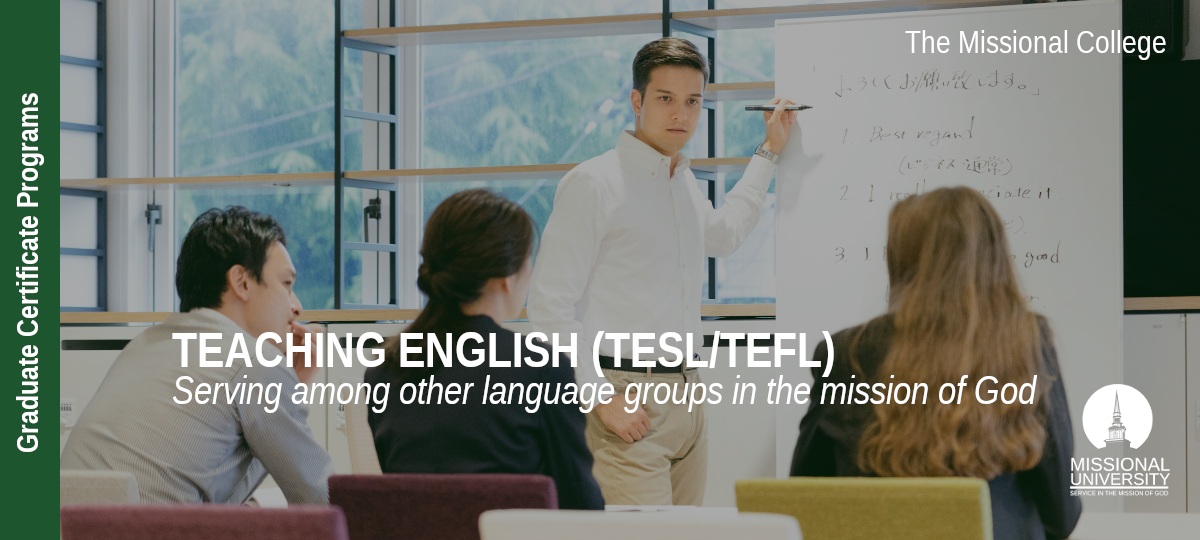
Online Graduate Certificate Program in
Teaching English (TESL/TEFL)
School: Missional College // Study Area: Serving Among Cultural Differences
☩ Same as Other Universities, But with Missional Integration
Expand Your Intercultural Abilities Today!
REQUEST INFORMATION
Ready to learn more about the
Graduate Certificate in
Teaching English (TESL/TEFL)?
LEARN MORE NOW
The Graduate Certificate in Teaching English (TESL/TEFL) provide students with the knowledge and skills to teach English to speakers of other languages (TESOL), to students for which English is a second language (TESL), and to teach English as a foreign language (usually in a country that is not predominantly English-speakin) (TEFL). Through the certificate program, students gain the following capabilities:
-
- ability to articulate the sweeping narrative of God's story of global redemption throughout the Old and New Testament
- ability to observe and evaluate the teaching of English in its global, social, economic, personal and cultural contexts
- ability to articulate and apply key concepts and principles to the study of the nature and structure of language including phonetics, phonology, morphology, syntax, semantics, and pragmatics
- ability to develop listening and speaking skills whereby the student integrates language skills with living, social, academic and professional skills from an intercultural perspective
- ability to develop practical reading and writing skills and integrate those skills with practical language skills
- ability to create TESOL materials through collecting and organizing authentic linguistic and cultural data and developing TESOL curriculum by planning lessons and designing communicative tasks.
You don't have to travel abroad to teach English; there are plenty of immigrants who need help learning the English language. You may have opportunities to teach English as a second language (ESL) at a public school, community college, community center, church, library, corporation or for a private group. But you may also teach English in another country where you will experiece another culture and see the world in a way no tourist can. it’s a chance to do something wonderful and adventurous that will change your life forever. Teaching abroad captures what international exchange is all about. It’s people from very different cultures coming together, learning from one another, and making positive connections. It’s a way to travel, gain work experience, and do good all at the same time. It's an amazing chance to change lives for the better. Helping young students learn English opens doors to new opportunities for them. And helping adult learners enables them to communicate with English-speaking relatives and become more competitive in the global economy. Many faith-based organizations offer opportunities to serve abroad teaching English.
Program Features
-
Integrated practicums allow you to gain valuable real-world experience
-
Learn from academic practitioners from around the world
-
Credits earned in this certificate program can apply to a Missional University Master's degree program
Course Effort
Course Length
Credits Required
Program Cost
What Will I Study?
We offer the most comprehensive approach to serving among other language groups in the mission of God.
Analyzes the Biblical understanding of human nature related to race and ethnicity. The student will explore various philosophical and historical perspectives, biblically respond to these, and develop ministerial and missional strategies for engaging issues such as racism, immigration, justice, and the refugee crisis.
Compares the important personalities, theological works, and issues defining the study of Christian theologies in modern Africa. Cultural/theological impacts of pre-modern, modern, and postmodern issues on contemporary African Christian theologies will be analyzed. The student will understand and engage the shift of Christianity from its Western “homeland” to Africa, and the responsibility, problems and opportunities these shifts pose for biblical Christianity in Africa.
To give a meaningful and purposeful existence to its adherents and to have public prophetic voice, African Christianity needs to make deep and significant contribution in interpreting the past, analyzing the present, and setting a path for the future. The impact of the slave trade and colonialism is still haunting Africans after many generations. The global financial system, the presence of China in Africa, the corruption in African leadership, the higher level of unemployment, and the challenge of radical Islam, begs for theological and missiological analysis. For many Africans, the future is dark. This course provides theological understanding of the past, and missiological analysis of the present and the future.
In literature and art, up until recent time, Africans hardly depicted as major contributors to Western Christian theology and pedagogy. The world, particularly the Western Christians are clueless that before the first convert of Anglo-Saxon, Christianity had ten generation in some part of Africa. Among other things, this course presents how the Western idea of university is born in the crucible of Africa, how exegesis of the scripture and Christian dogma matured in African continent, how Christian Neoplatonism emerge in Africa, and how rhetorical and dialectical skills are honed in Africa and how all these ideas were transplanted to the Western Christendom.
Despite the perceived declining of Christianity in the West, Christianity in Africa is growing rapidly. With an increase of 4,000% in the last century, and an annual growth of 2.5%, Africa is one of the fastest growing Christian continents in the world today. Despite the social unrest, poverty, external and internal exploitation and injustice Africans go through; it is undeniable that a strong sense of the Divine pervades the ordinary lives of the peoples of Africa. African converts primarily became Christians instead of church members. Africans have recognized the radical quality of God’s self-disclosure in Jesus Christ and they understand the God of the Bible within their own idioms and cultural accoutrements. This course explores the insinuation of the current Christian growth in Africa on the various challenges the continent face and the implication of growth on global Christianity.
Since the modern Western mission in the continent, African Christianity has been struggling to find its own identity to imbed in African culture, to be the faith of Africans that pervade their mind and soul and speak to their daily life in every context. Because of the unhealthy marriage of mission and colonialism, by many Africans, at the beginning of Western mission, Christ was perceived as uninvited guest. This course examines the progress of African Christianity and its potential impact in global mission.
Optional Additional Courses:
Exploration the differences between "folk" and "world" religions. Anthropological methods for understanding folk practices on their own terms and in relationship to other practices/perspectives is also covered.
Introduction to folk art; its nature, scope and characteristic visual forms and styles. Students learn to study a range of utilitarian and decorative media, including cloth, wood, paper, clay, metal, etc. that convey a community's authentic cultural identity, rather than an individual or idiosyncratic artistic identity.
This course is an advanced course designed to give students an in-depth understanding of natural resources in the African continent. Detailed cases students of selected countries will be done by students to establish the root causes of the present paradox experienced by the African continent, whereby the continent has some of the largest deposits of natural resources yet has some of the poorest countries. Cases studies will place special emphasis on an understanding of the natural resources in the African continent and the environmental socio-economic, and political impact of the exploration and exploitation of these resources.
To give a meaningful and purposeful existence to its adherents and to have public prophetic voice, African Christianity needs to make deep and significant contribution in interpreting the past, analyzing the present, and setting a path for the future. The impact of the slave trade and colonialism is still haunting Africans after many generations. The global financial system, the presence of China in Africa, the corruption in African leadership, the higher level of unemployment, and the challenge of radical Islam, begs for theological and missiological analysis. For many Africans, the future is dark. This course provides theological understanding of the past, and missiological analysis of the present and the future.
When Can I Get Started?
We offer multiple start dates each year to give you flexibility in your education, life and work schedules.
JANUARY
MARCH
MAY
AUGUST
OCTOBER
A Career in Navigating Cultural Difference
Is this Your Mission?
Academic ESL Instructor, Adult ESL Instructor, Adult ESL Teacher, Director of International Programs, English/ESL/TESOL Instructor, English as a Second Language Instructor, English As A Second Language Teacher, English as a Second Language Teacher Online, English Language Learners Teacher, English Language Trainer, English Tutor, Enterprise ESL Teacher, ESL Instructor, ESl Teacher, ESL Teacher for Children, ESL Teacher Online, ESOL Instructor, ESL/TEFL English Instructor, In- School English Language Learner Tutor, Instructor-English Language Acquisition, Intensive English Program (IEP) Instructor, International English Language Teacher, International ESL Teacher, Online ESL Second Language Tutor, Online Language Tutor, Online English Teacher, Online English Teacher / Tutor, Online English as a Second Language Tutor, Sr. Development Editor, TESOL Instructor, TESOL Teacher, Youth Program Specialist
Request Information Now
How Much Will it Cost?
We offer tuition based upon country of residence. According to the Human Development Index, all countries around the world fall into one of four categories:
-
(Tier 1) - Very High Human Development
-
(Tier 2) High Human Development
-
(Tier 3) Medium Human Development
-
(Tier 4) Low Human Development
Our tiered global tuition makes higher education affordable for everyone world wide.

TIER COUNTRIES
100% Tuition
$395
per credit hour
3 credit course
$1185

TIER COUNTRIES
80% Tuition
$316
per credit hour
3 credit course
$948

TIER COUNTRIES
60% Tuition
$237
per credit hour
3 credit course
$711

TIER COUNTRIES
40% Tuition
$158
per credit hour
3 credit course
$474
Tiered tuition based on country of origin and scholarships available. Find your country of residence here for more information.
Tuition may be further reduced by participating in the Sponsorship Program.
